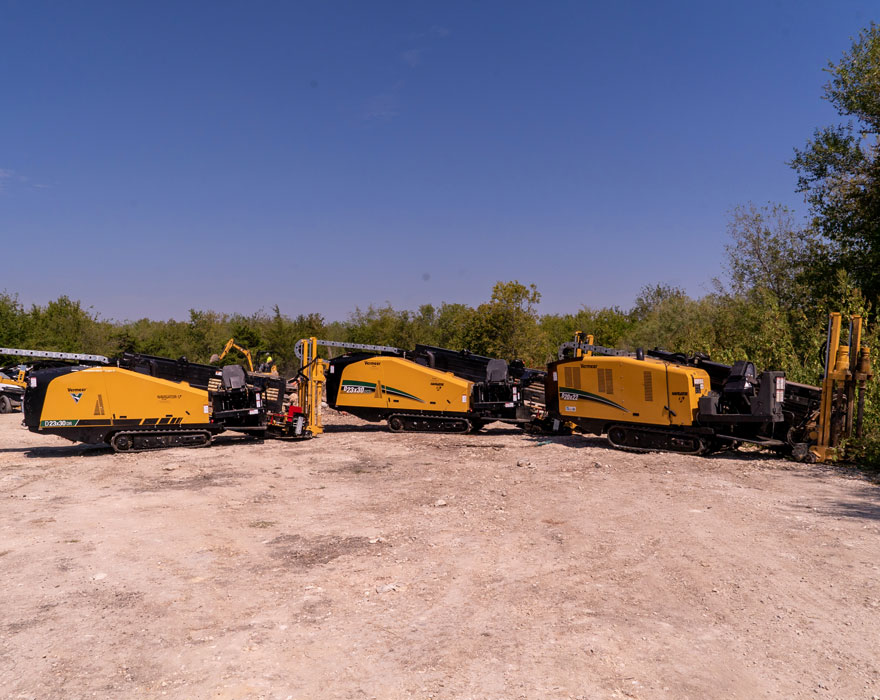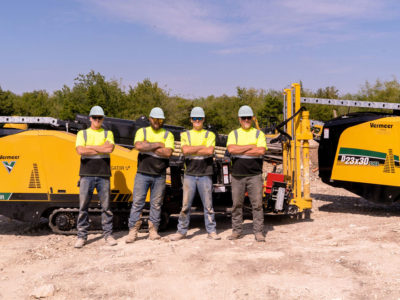Hitting it hard seven days a week, drilling fiber conduit through the rocky grounds of the greater Austin, Texas area, that’s how Mike McCall, his two sons (Landon and Logan) and a couple of drilling crews spend every week. They wouldn’t have it any other way. “I don’t believe we’ve taken a day off in the last three years,” said oldest son Landon.
But the family who launched their horizontal directional drilling (HDD) career around the same time they had their last day off wouldn’t have it any other way. They love what they do. And they get to spend time together every day, working hard and growing the family business, McCall Drilling.
To navigate the challenging ground conditions around Austin, the McCalls rely on a couple of dual-rod Vermeer D23x30DR S3 HDDs, Vermeer MX125 mixing systems, water trucks, a pair of Vermeer trailer vacuum excavators for potholing and mud management, and a plethora of rock tooling. This two-crew setup is a far cry from the equipment the family started with.
Launching a business
March 21, 2018 — that was the day Landon McCall started a company Facebook page for the family startup drilling company. At the time, they were living and working in the Atlanta, Georgia, area. There, Mike ran a small plowing and trenching business performing shallow utility drops.
“I did utility trenching and plowing work for 20 years,” Mike explained. “Around the age of 16, Landon took a real interest in helping. Logan, who’s a few years younger, also started becoming interested around same time. When both kids finished high school, they still wanted to work with me, but I knew as a family we could build something bigger. That’s when the three of us sat down and decided our future was in HDD work.”
The McCalls purchased a used Vermeer D16x20 Series II HDD and a McLaughlin vacuum excavator built in 1998 that they still own and operate today and started prospecting. “We created a Facebook page as a way to look for work,” said Landon. “We didn’t necessarily care where the work was. We just wanted a chance to prove ourselves.”
Shortly after making the decision, the McCalls got the call they were waiting for. “We connected with a contractor working in Austin who needed another crew to help install fiber for AT&T,” explained Landon. “We were extremely upfront with him and told him we had little experience doing HDD work. His response was, ‘Well, you’re going to have to learn sometime.’ So, we loaded up our belongings and headed south. We’ve been working in that area ever since.”
Moving south
What keeps the McCalls busy these days is the push for 5G. The two McCall crews are helping install the thousands of miles worth of fiber required to power Verizon’s mobile network. The company did about 50,000 feet (15,240 m) of fiber work last year, mostly in rock, and is on pace to beat that number this year.
“In this part of Texas, you have to fight for every foot,” said Logan. “We did a lot of fighting with Texas sandstone that first year. We worked a small dirt drill in rock and got the most out of that machine. We also learned a lot along the way.”
The biggest lesson the McCalls learned was there is a different way to drill in rock. “We saw a few other contractors in the area using dual-rod machines designed for boring in rocky grounds,” Logan added. “It was time to upgrade our operations.”

Investing in dual-rod technology
The family demoed a few machines and accepted an invitation from their Vermeer rep, Scott Shuffield at Vermeer Texas-Louisiana, to demo a Vermeer dual-rod drill prototype getting ready to launch. “It was the D23x30DR S3, the dual-rod version of one of the most widely used utility drills in the industry. After trying it out, we placed an order almost immediately. It is the perfect size for the work we do.”
Having demoed other dual-rod machines, Landon said there is no comparison for fiber work. “Other machines have a giant footprint. They are heavy, loud and don’t deliver any better production. Pound-for-pound, the D23x30DR S3 runs circles around the other machines we demoed. Also, it’s so quiet — when it’s running you can carry on a conversation with someone near the drill without raising your voice. This is a huge plus when we’re working in residential areas.”
Today, the two dual-rod drills can be found working throughout greater Austin — downtown, suburbs and the rural area. “The constant change of scenery is one of the reasons why I like doing this job so much,” expressed Logan. “Boring is never boring. There’s always some new challenge to solve from one jobsite to the next.”
Recipe for success
The drilling package and process McCall Drilling finds works best for them starts with their dual-rod drills, a mud mix of bentonite and bore gel, a Vermeer TCI tricone bit and a Vermeer pulling eye. On most shots, the drill operator will empty the 300-foot (91.4-m) drill rod basket of the D23x30DR S3, pop out and swap out tooling, and then pull back a bundle of two 2-inch (5.1-cm) diameter fiber conduit. It’s a process that gets repeated six days a week. On the seventh day, the crew prepares for the week ahead.
There are times when a bore may require the crew to drill longer than 300 feet (91.4 m). For those, they will borrow a few rods from their other D23x30DR S3. They have completed a few shots that required both baskets of drill rod — 600 feet (182.9 m).
“A few things we’ve learned out here is bore gel is critical, and you should use lots of fluid,” Landon explained. “We also make it a point to spin off our drill bit after the pilot bore is completed in exchange for a pulling eye. We know many other folks will leave tooling in place during pullback, but we like having that bit of extra clearance without it. We would rather spend a little extra time swapping tooling than risk getting stuck during pullback.”
The McCalls also have a D20x22 S3 HDD that doesn’t get used every day. “We like keeping that machine around for doing shorter road crossing and those rare times we are not boring in rock,” said Landon. “We can steer tighter with that machine, so on road crossings, we can turn at a sharper angle going down and coming back up. On the front of that machine, you will usually find a Vermeer Ace™ Pro bit because even the dirt in Texas feels like rock around here.”
Maximizing productivity
Working the drills six days a week means machine hours add up quickly. Daily walkarounds, greasing, checking fluids, etc. and following the preventative maintenance schedule outlined in their machines’ maintenance manuals is the way things are done at McCall Drilling. And it’s that commitment that keeps those drills running almost every day, Mike said. “We have to take care of the equipment the same way we take care of our people, and that means doing preventative maintenance.”
For almost all their service work, the McCalls rely on the team at Vermeer Texas-Louisiana. “In this line of work, we’re constantly moving machinery. We want to keep the supplies we have on hand as minimal as possible, and our team focused on what we do best: drilling. Using our dealer to service equipment means we don’t have to carry extra supplies for service work or haul a machine back to the shop. We make a call and the service team takes care of the rest. It’s easy and allows us to keep going.”
The McCalls don’t necessarily see what they do as work; it’s more of a shared adventure that keeps delivering positive results every day. “What father doesn’t dream of building a business with his kids? Landon and Logan are the best business partners a person could ask for,” Mike concluded.
This article contains third-party observations, advice or experiences that do not necessarily reflect the opinions of Vermeer Corporation, its affiliates or its dealers. Testimonials and/or endorsements by contractors in specific circumstances may not be representative of normal circumstances experienced by all customers.
Vermeer Corporation and McLaughlin Group, Inc. reserve the right to make changes in engineering, design and specifications; add improvements; or discontinue manufacturing at any time without notice or obligation. Equipment shown is for illustrative purposes only and may display optional accessories or components specific to their global region.
Vermeer, the Vermeer logo and Ace are trademarks of Vermeer Manufacturing Company in the U.S. and/or other countries. All other trademarks, registered trademarks and service marks are the property of their respective owners. © 2021 Vermeer Corporation. All Rights Reserved.
